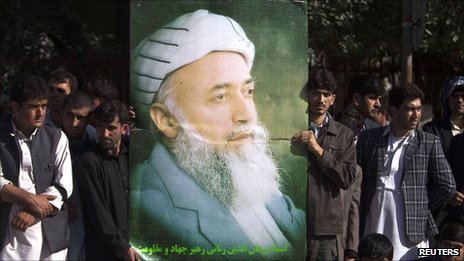 Hundreds of Afghans have gathered in Kabul to mourn High Peace Council chief Burhanuddin Rabbani and protest at his killing by a suicide bomber on Tuesday.
Hundreds of Afghans have gathered in Kabul to mourn High Peace Council chief Burhanuddin Rabbani and protest at his killing by a suicide bomber on Tuesday.
Kabul was gridlocked as streets were sealed off around Rabbani's home, where ex-colleagues arrived to pay respects.
Rabbani, head of the council charged with talking to the Taliban, was killed by a bomb hidden in a turban.
President Hamid Karzai has cut short his visit to the UN in New York to return to Afghanistan.
'Resistance leader'
The BBC's David Loyn in Kabul says black awnings were draped over the streets close to Rabbani's home as a mullah's chants carried through the air.
Former warlords were among those paying respects, he says, arriving in cars with blackened windows.
There was heavy security in Kabul's diplomatic zone, where Rabbani's house is located, with police searching all those arriving.
Several hundred people, many wearing black headbands, carried pictures of Rabbani and chanted Koran verses.
One mourner, Hayatullah, told Reuters: "We came to express our condemnation to the enemies of peace and stability, the enemies of our country and government. We condemn the assassination of our jihad and resistance leader."
Kabul resident Mirza Mohammad told Associated Press: "He wanted peace in Afghanistan and sacrificed his life on the path of bringing peace."
Muslim tradition requires an immediate burial. There will be a special ceremony in the presidential palace before Rabbani's body is taken to his home province of Badakhshan in the north-east.
No-one has yet said they carried out the attack and our correspondent says it could be one of a number of insurgent groups.
Rabbani, 71, had been meeting Taliban commanders, returning from abroad a few days ago specifically for the talks.
Peace Council member Fazel Karim Aymaq said two visitors were invited to the meeting on Tuesday who said they had "special messages" from the Taliban and were considered "very trustworthy".
"One of them put his head on the shoulder of Rabbani and detonated the explosives hidden in his turban," Mr Aymaq said.
President Karzai said of the killing: "This is a sad day for us in Afghanistan but a day of unity and day of continuity for our efforts."
Our correspondent says the international community will want Mr Karzai to appoint another Peace Council head quickly to continue the work, but former members of the anti-Taliban Northern Alliance, made of mostly non-Pashtun ethnic groups, who have said peace talks will never work, will gain political strength from this killing.
Series of assassinations
When the High Peace Council was set up in October 2010, Mr Karzai described it as the greatest hope for the Afghan people and called on the Taliban to seize the opportunity and help bring peace.
But many members of the council are former warlords who spent years fighting the Taliban and their inclusion led to doubts as to whether it could succeed in its mission.
Our correspondent says Rabbani's appointment as head was a surprise. Some had even called for him to be indicted for war crimes in his previous role with the mujahideen.
In the 1970s it was Rabbani who founded the parties that ended up becoming the Afghan mujahideen who took on the Soviets, and many blame him and his friends for the death and destruction of the civil war days.
Rabbani was ousted as president by the Taliban in 1996. After that he became the nominal head of the Northern Alliance.
When they swept back into Kabul, backed by US forces, and toppled the Taliban in 2001, he was still recognised by the UN as the official president of Afghanistan.
The killing is the latest in a series of assassinations of senior politicians and security commanders across the country.
In July, President Karzai's half-brother Ahmed Wali Karzai was killed at his home in Kandahar, southern Afghanistan, by his own head of security. Two months earlier, Gen Daud Daud, the top police commander in northern Afghanistan was killed in a suicide bomb attack.
The Taliban have claimed responsibility for most of these killings.



